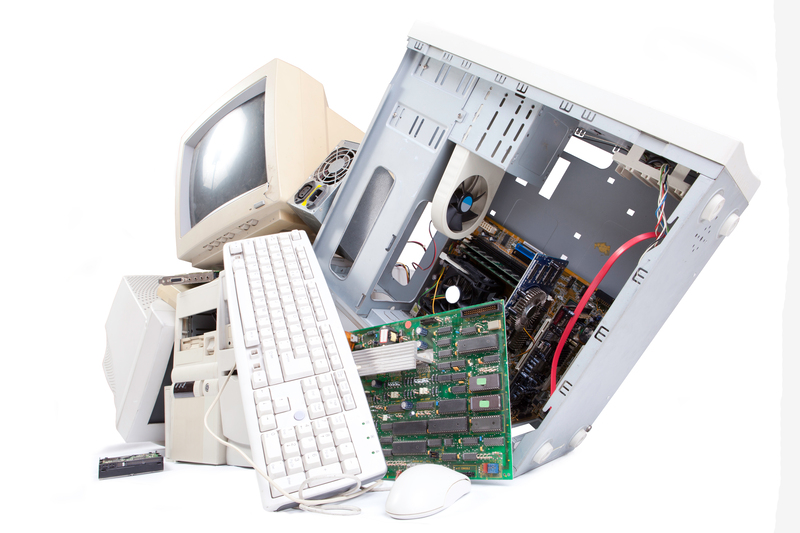Innovative Disposal Options for Your Elderly Chargers
Are tangled wires and unused electronic chargers piling up in your drawers? Old phone chargers, laptop adaptors, and other cable relics accumulate over the years, especially as devices change and improve. But tossing these elderly chargers in the trash can be harmful to the environment and even illegal in some areas. It's time to explore innovative disposal options for your elderly chargers--solutions that are not just safe and responsible, but can even be creative and community-oriented.

Why Proper Charger Disposal Matters
Before jumping into unique disposal or recycling strategies, it's important to understand why disposing of obsolete chargers responsibly is so crucial:
- Environmental Impact: Chargers contain plastics, copper, and sometimes lead or other metals, which can leak into soil and water when dumped in landfills.
- E-waste Regulations: Many regions have strict laws about electronic waste (e-waste), including chargers, to reduce environmental harm.
- Resource Recovery: Chargers can be a surprising source of valuable recyclables like copper and rare earth metals.
Creative Recycling and Upcycling
The traditional way to get rid of aging chargers was dropping them off at an e-waste site. But with growing environmental awareness, communities and individuals are thinking outside the box. Here are some innovative disposal options for elderly chargers that go beyond the basics.
1. Manufacturer Take-Back Programs
Many electronics companies now offer take-back or recycling programs. These programs let you mail in or drop off your outdated phone charger, cables, and other accessories directly to the brand for responsible handling.
- Apple's GiveBack program lets consumers return any brand of chargers at their stores.
- Best Buy features in-store bins for small electronics recycling.
- Other companies (HP, Dell, Samsung) advertise tech recycling at no cost.
Tip: Always check your manufacturer's or retailer's website for the latest collection or recycling initiatives.
2. Donate to Local Schools or Charities
Did you know your vintage chargers could help support community projects? Many educational institutions and non-profits collect electronic accessories for students who need them, especially for models still in use.
- Contact local schools, libraries, or youth centers to see if they accept donations.
- Some international charities, like Tech for Good, refurbish electronics for those in underprivileged areas.
Donating is especially useful if your chargers are still functional and compatible with devices people regularly use.
3. Participate in Community E-Waste Events
Most cities organize special e-waste collection days. Find out when your municipality is collecting small electronics or chargers.
- Events are advertised on city or county websites.
- They provide secure, eco-friendly disposal and recycling of chargers and cables.
Bonus: You might even score a discount voucher or small reward for participating!
4. Try Creative Upcycling Projects
If you're handy or crafty, why not give your aged chargers a second life in a creative way? Some unique upcycling ideas include:
- Cable Organizers: Use old charger cords as ties for organizing other wires.
- Art Installations: Artists use e-waste, including chargers, for sculptures and collages.
- DIY Gadgets: Tinkerers salvage parts for hobby electronics, like Arduino projects or robotics.
Try searching online communities or craft sites for more innovative charger disposal ideas you can try at home!
Eco-Friendly and Responsible Recycling
5. Specialized E-Waste Recycling Facilities
The safest bet for responsible charger disposal is a certified e-waste recycler. Unlike standard recycling centers, these businesses handle electronics of all sizes and can break down chargers into parts for safe reuse or reclamation.
- Look for facilities certified by R2 (Responsible Recycling) or e-Stewards standards.
- Many accept walk-ins, and some offer pickup services for large amounts.
- Some local electronics retailers partner with recyclers and provide drop-off bins in their stores.
Pro tip: Visit Earth911 to find nearby e-waste collection points and drop-off locations.
6. Postal Recycling Services
There are innovative mail-in services, too! Some companies provide mail-back programs for retired chargers and cables:
- Order a prepaid envelope online, fill it with your unused chargers, and mail it back.
- This service is ideal if there are no robust recycling centers near your location.
- It's convenient, secure, and environmentally conscious.
Brands such as TerraCycle and Call2Recycle offer national services that safely process all components.
7. Electronics Retailer Drop-Offs
Many electronics retailers have stepped up, providing bins for disused charger recycling at their stores. These include:
- Best Buy (US & Canada)
- Staples
- Office Depot
- Currys PC World (UK)
These stores usually accept an array of small electronics, including adapters and mobile phone cables, regardless of where you bought them.
Cutting-Edge Alternatives and Repurposing
8. Charger Swap and Sharing Initiatives
There's a growing movement towards reuse before recycling. Charger swap events allow individuals to exchange chargers they no longer need with others, reducing the demand for new ones.
- Check out local tech meetups, community "swap days," or university bulletin boards.
- Some non-profit organizations organize electronics swap events to promote sustainability.
Tip: Facebook groups, local online forums, and apps like Freecycle often list such events.
9. Repurpose Elderly Chargers in DIY Projects
If you have skills in electronics, discarded chargers can serve as excellent parts for new inventions:
- Power supply for Arduino boards or Raspberry Pi.
- Low-voltage lighting for shelves or under cabinets.
- Charging multiple devices simultaneously in a "charging station."
- Building educational kits or science experiments for schools.
Remember: Always handle wires and electronics carefully, following safety procedures and proper use guidelines.
10. Art and Educational Programs
Some schools and community centers collect old electronic chargers for STEAM (Science, Technology, Engineering, Arts, and Mathematics) education or art classes. These chargers become:
- Raw materials for teaching electrical concepts.
- Supplies for group projects or engineering competitions.
- Materials for artistic creations and upcycling competitions.
Donating your obsolete chargers in this way supports education and creativity, extending their useful life.
What to Avoid When Disposing of Elderly Chargers
Not all disposal methods are safe or legal. Here are the top mistakes to avoid:
- Do NOT throw chargers in the general waste bin: They do not degrade and may leach toxins in landfills.
- Avoid burning or dismantling at home: Dismantling can expose you to hazardous substances.
- No illegal dumping: Abandoning electronics in public spaces is hazardous and heavily fined in many places.
Choosing a certified recycling or reputable reuse option is always best for your community and the environment.
Innovative Global Solutions to Charger Waste
Around the globe, researchers, companies, and governments are targeting the growing mountain of obsolete charger waste.
Universal Charging Standards
The European Union has made USB-C a universal charging standard for most small devices. This move, mirrored by other well-regulated markets, significantly reduces the need for multiple chargers and will eventually lower the volume of charger-related e-waste.
Read more about the EU's common charger law here.
Next-Generation Biodegradable Chargers
Some tech startups are developing biodegradable charging cables and adaptors. As these products hit the mainstream, future disposal will be less of an environmental burden.
- Look for products labeled "Compostable" or "Biodegradable" when replacing old chargers.
- Support companies offering take-back or closed-loop manufacturing processes.
Zero Waste Tech Hubs
Forward-thinking cities--from San Francisco to Amsterdam--are piloting zero waste electronics hubs, where residents can drop off not only chargers but all tech accessories for free. These hubs sort, strip, and repurpose components, drastically reducing landfill waste.

How to Prepare Your Elderly Chargers for Disposal
Before handing over your chargers to any recycling or reuse option, take a few preparatory steps:
- Untangle and organize: Bundle matching cords together for easier sorting.
- Clean off dirt or dust: Wipe them down for hygiene and easier handling.
- Test functionality: Separate working from non-working accessories--some places only accept operational items for reuse.
- Remove batteries: If any part contains a battery (e.g., external battery packs), these should be separated and sent to certified battery recyclers.
Conclusion: Make an Impact with Smart Charger Disposal
It's easier than ever to give your elderly chargers a second life or ensure they don't harm the planet. With so many innovative disposal options--from retailer drop-offs and community swaps to educational reuse and specialty recyclers--your effort supports both sustainability and community development.
Whether you recycle, upcycle, donate, or repurpose, every charger responsibly disposed of is a tiny victory for the environment. So, next time you clean out that junk drawer, consider these ideas and choose the best cutting-edge disposal method for your outdated chargers.
Take action today and inspire others to join in building a cleaner, greener future--one charger at a time.